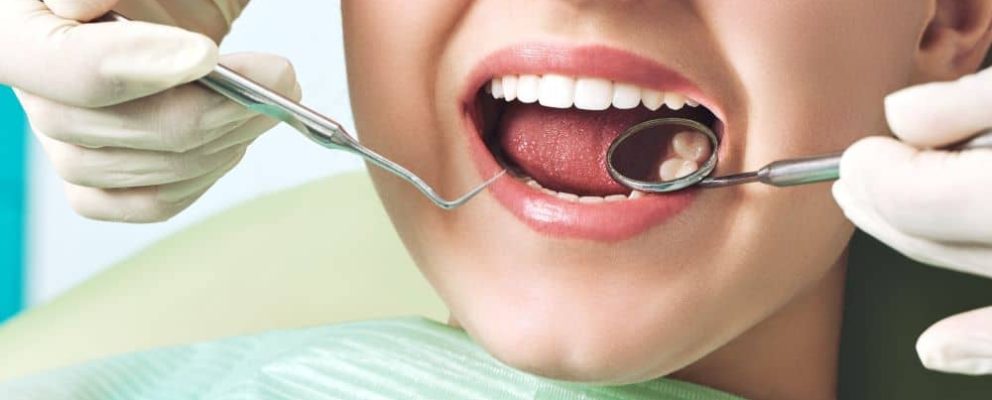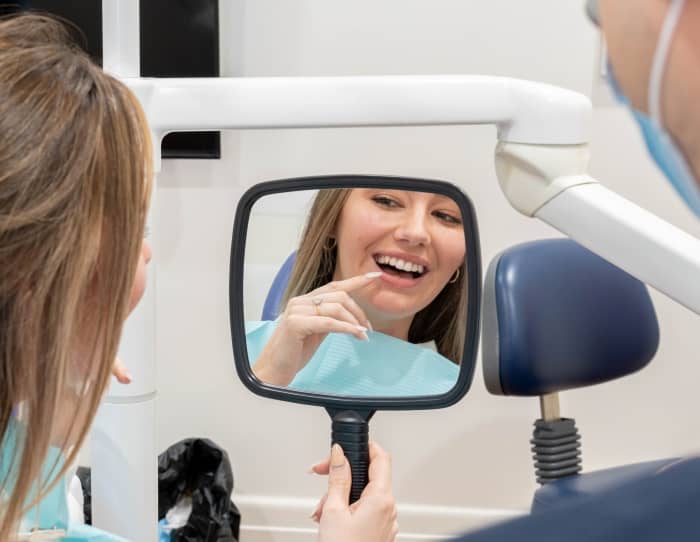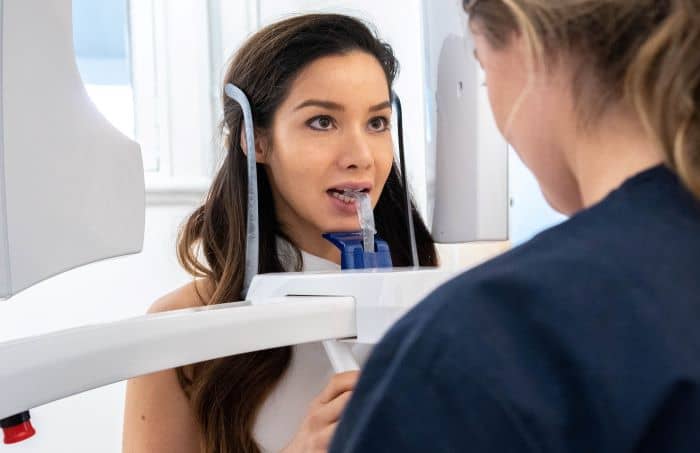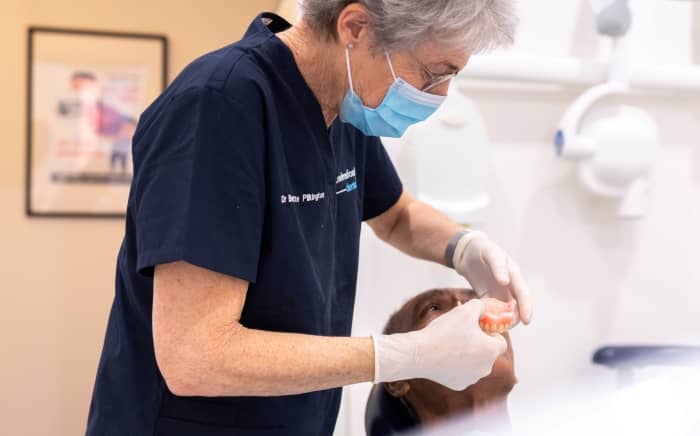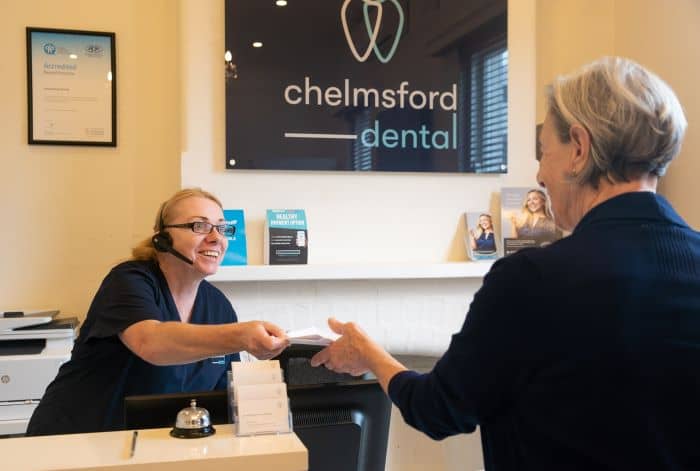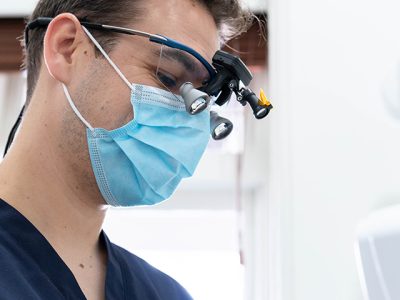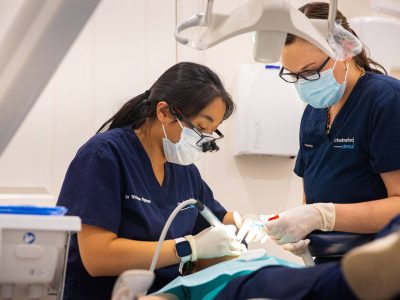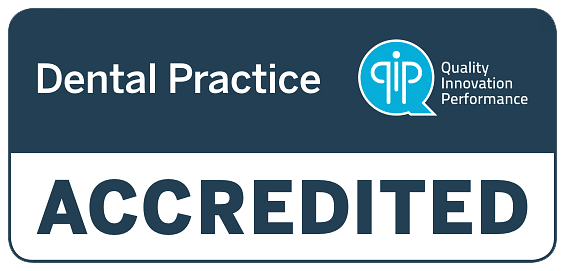Have you ever wondered how important dental checkups are? If you’ve ever considered skipping a dental checkup because it is ‘just a cleaning’, keep reading.
Here, we’ll cover what a general dental checkup involves and why these visits are a crucial part of maintaining a healthy, bright smile. We’ll also answer frequently asked questions about dental checkups, along with providing oral hygiene tips for making your dental exams go as smoothly as possible.
What Can I Expect From a General Checkup?
Dental visits involve so much more than a simple cleaning. Dental checkups include a professional dental cleaning, a thorough dental exam, and an evaluation of your oral health.
A professional dental cleaning generally involves:
- The removal of plaque, a sticky build-up on teeth that can lead to inflamed gums, periodontal disease, bleeding gums, and health complications
- The removal of tartar, hardened plaque that requires specific dental tools to get rid of
- Brushing and polishing the teeth
- The application of sealants, if needed, to protect teeth that are especially susceptible to decay
- The application of topical fluoride, if needed
Along with a scale and polish, dental checkups include an oral health examination that involves:
- X-rays, as needed, to check for dental issues that are below the gum line, in between teeth, under fillings, or other hidden areas
- Tooth decay detection
- Gum disease detection
- Screening for oral cancer or other health issues
What Are the Benefits of Regular Dental Checkups?
Both children and adults benefit from preventative dentistry. The benefits of regular dental checkups include:
- Prevent Cavities, Decay, Plaque, and Tartar — No matter how consistent you are with brushing, some areas of the mouth are hard to reach. Once plaque builds up, it turns into tartar that can only be removed by your dentist. Left untreated, tartar can lead to discolouration, gum disease, tooth loss, bath breath, and other dental issues. Regular dental visits clear away any plaque or tartar to prevent cavities and decay. If a cavity is detected, your dentist can treat it right away to prevent further complications.
- Protect Your Overall Health — Oral health and dental health are closely related. Along with reducing your risk of enamel loss, cavities, periodontitis, and tooth loss, good oral hygiene can help prevent various health problems. Health issues connected to poor oral health include cardiovascular disease and certain cancers.
- Save Money — Catching dental problems early can spare you from needing costly dental treatments. For instance, catching a cavity and treating it right away is a straightforward, affordable process. If the same cavity goes untreated, a patient can wind up in a great deal of pain and need root canal treatment.
- Prevent Bad Breath — If you are tired of bad breath, talk to your dentist. It may be a result of gingivitis, poor diet, poor oral hygiene, periodontitis, or other oral health concerns. Your dentist can help pinpoint the underlying cause of your bad breath and create a treatment plan to address it.
- Detect and Prevent Gum Disease — Most often, gum disease does not show any symptoms in its early stages. However, your dentist can detect gum disease even before symptoms show up. When treated early, gum disease is easier to treat and less expensive to treat. Early treatment can also spare you from complications such as jaw damage, discomfort, and tooth loss.
- Get Oral Health Education — During dental checkups, your dentist will discuss your oral hygiene routine with you and advise you on any necessary changes. Your dentist can also answer questions about brushing techniques, the best toothbrush recommendations, what toothpaste you should be using, and more. Dental checkups are also a great chance for kids to become more involved in caring for their teeth and developing healthy habits.
- Discuss Cosmetic Dentistry — Are you interested in straightening your teeth with Invisalign, whitening your teeth, or other cosmetic dentistry procedures? You can discuss cosmetic dentistry options during a dental checkup and find out if you are a good candidate for certain procedures.
FAQs About Dental Checkups
- How Often Should I Visit the Dentist?
The Australian Dental Association recommends getting a dental checkup every 6 months. Individuals with certain dental conditions may need to schedule dental checkups more often. Your dentist will advise you on the proper dental checkup schedule for you.
- How Often Should Children See a Dentist?
Dental checkups are just as important for children as they are for adults. Did you know kids as young as two can get cavities? Your dentist can advise you on when your child should have their first dental checkup.
Generally, it is recommended to schedule your child’s first dental checkup as soon as their first tooth erupts or around their first birthday.
Along with catching dental issues early, taking your child for regular dental visits helps them gain a level of comfort and familiarity for future appointments. This sets the foundation for a lifetime of healthy teeth.
- Do I Have to Prepare for a Dental Checkup?
Aside from maintaining a good oral hygiene routine in between checkups, you do not need to do anything to prepare for a dental visit. However, it is important to let us know if you experience dental anxiety.
Our team will do everything we can to ensure your dental visit is as comfortable as possible. If needed, we offer sedation dentistry to help you feel more relaxed during dental treatments, including routine checkups. You can learn more about sedation dentistry here.
- Why Are X-Rays Important?
Certain dental conditions and diseases are invisible to the naked eye. This makes X-rays a crucial tool for detecting dental diseases as early as possible.
X-rays can detect bone infections, periodontal disease, abnormalities, certain tumour types, abscesses, and areas of decay that are otherwise hidden by fillings.
Detecting dental problems early is the best way to prevent costly treatments and complications down the road.
- How Should I Care for My Teeth In Between Dental Checkups?
Maintaining a good oral hygiene routine between dental visits is one of the best ways to keep your teeth healthy and prevent complications.
Adults and children should practice the following oral hygiene tips to keep their teeth healthy:
-
-
- Brush your teeth at least twice a day
- Floss at least once a day (check out our post on the importance of interdental cleaning to learn why flossing is a key part of a good oral hygiene routine)
- Avoid or limit the consumption of sugary sweets or sticky candies or soft drinks
- Ask your dentist for a recommendation on the best toothpaste with fluoride
- Ask your dentist if you should be using fluoride mouthwash as part of your oral hygiene routine
- Avoid smoking or using tobacco products
- Pay attention to how much alcohol you consume
- Eat a balanced diet featuring nutrient-dense, whole foods such as fruits, vegetables, nuts, seeds, eggs, healthy fats, wild-caught fatty fish, lean meat, and whole grains
- Make sure your diet includes enough calcium
- Brush your tongue every day
-
- Why Is Fluoride Important?
Fluoride strengthens tooth enamel to help protect it against decay by adding reparative minerals to teeth. Fluoride can be applied topically to teeth during a dental checkup. It can also be found in certain toothpaste and mouthwashes.
Systemic fluoride is ingested to fortify teeth from the inside out. Your dentist can advise you on the best way to use fluoride in your dental hygiene routine.
- Do I Need to Visit the Dentist Even if I Have Dentures?
You may assume that individuals with few to no natural teeth can skip seeing the dentist but this is a misconception. Even individuals with a full set of dentures must attend regular dental checkups.
During a dental checkup for dentures, your dentist will perform key evaluations. Most importantly, your dentist will check the fit of your dentures to ensure they are not loose or slipping around. With age, the jaw can change shape, causing dentures to fit improperly and causing issues.
Individuals who wear dentures need to see their dentist for regular checkups, at least once or twice every year. You may need to be seen more frequently if you are experiencing problems with dentures, such as mouth sores or a loose fit. Your dentist will let you know how often you should schedule dental checkups with dentures.
- Do I Still Need Dental Checkups If I’m Pregnant?
Yes, you still need routine dental checkups when you are pregnant. Dental hygiene is especially important during pregnancy since gum inflammation is more common among pregnant women due to hormonal changes.
Along with following a good oral hygiene routine at home, it is important to see your dentist regularly during pregnancy for checkups.
- How Long Does a Dental Checkup Take?
A dental checkup typically takes between 30 minutes and an hour. The length of the checkup will depend on how long your cleaning takes if you have concerns you want to discuss and whether you are due for a set of x-rays.
- My Teeth Feel Fine – Do I Still Need to See a Dentist?
Even if your teeth feel and look healthy, it is still crucial to attend regular dental checkups. Gum disease and other dental conditions may go unnoticed in the early stages without professional detection. Without early detection, a simple dental issue can turn into a painful, costly problem that requires extensive treatment.
Dentists have the equipment and knowledge needed to detect dental problems as early as possible. This ensures any issues can be treated right away before they can get worse.
- How Much Do Dental Checkups Cost?
The cost of a general check-up depends on several factors, including whether you need x-rays. At Chelmsford Dental, we accept all health funds as a way to ensure preventative dental care is as accessible and affordable as possible.
- Do You Need to Schedule a Dental Checkup?
If it’s been over six months since your last dental checkup, it’s time for a professional cleaning and exam. Regular dental checkups are key for keeping your teeth clean, functional, and healthy, along with preventing costly dental treatments and pain.
At Chelmsford Dental, we’re here to keep your smile bright, protected, and healthy. Our friendly team is here to help you and your entire family enjoy a smile they can be proud of.
Contact us today with any questions or use our convenient online booking tool to schedule an appointment.
